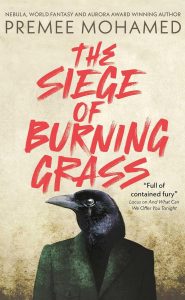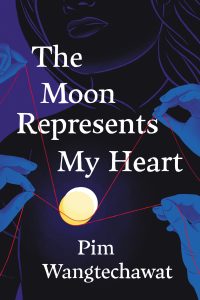Jake Casella Brookins Reviews The Siege of Burning Grass by Premee Mohamed
 The Siege of Burning Grass, Premee Mohamed (Solaris 978-1-8378-6046-3, $27.99, 432pp, hc) March 2023.
The Siege of Burning Grass, Premee Mohamed (Solaris 978-1-8378-6046-3, $27.99, 432pp, hc) March 2023.
“Weird” is a word that’s been worn thin with use, even in regular conversation. I hesitate to apply it in a genre sense – whether old or New – for fear of misusing it, wading too deep into niche categorization, or merely adding more wear to the term. But there’s a sense in which its normal use points to how I want to use it for Premee Mohamed’s The Siege of Burning Grass: weird meaning “strange,” meaning “new to me.” Meaning novel! Though it’s in many ways a grim story, full of careful studies of injury and deprivation, and though its innovation is more in strange juxtapositions than some head-of-Zeus novum, The Siege of Burning Grass has an authenticity and an unpredictability that feels refreshingly new in interesting ways.
Set in a world wracked by a war between two superpowers, the Varkullagi and the Meddon, the novel follows Alefret, a pacifist who was injured and subsequently captured by the Varkullagi. He’s a well-known member of “The Pact,” a loosely organized movement of nonviolent objectors, and the Varkullagi military hope to convince or coerce him into helping end the war by using his connections to sneak an agent into the Meddon high command. Escorted by his captor/colleague Qhudar, a fanatical young soldier, Alefret must struggle across a war-torn country at once fantastical and all too mundane, putting his convictions and his ingenuity to the test.
The wreckage of war is, sadly, not that strange: senseless violence, hunger and thirst, festering wounds, moments of camaraderie and enmity thrust into sharp relief by the blasted background, the almost unfathomable hypocrisy of those privileged enough to keep clear of the fighting they endorse. Mohamed infuses these aspects with startling realism – The Siege of Burning Grass put me in mind of much WWII-era fiction and non-fiction I’ve read – but also infuses them with strangeness. Weird, cool stuff: The Varkullagi use bioengineered creatures, healing wasps and tank-like pillbugs, while the Meddon have even stranger and more ethereal devices. Much here is alive when you wouldn’t expect it to be, and Alefret’s care for these creature-devices is a nice thread throughout. There are also just straight-up weird elements that somehow fit nicely with the rest: an army camp in a giant skeleton, trained pteranodons, and strange floating cities. The way that cultures and strange military technologies are thrown together here – and the floating cities, and the theme of nonviolence in the midst of war – pairs very nicely with Adrian Tchaikovsky’s recent House of Open Wounds, and, like that novel, there’s a touch of humor throughout Alefret’s story.
This all works so well thanks to Mohamed’s assured, inventive prose. Alefret’s bodily reality is constantly foregrounded, and the philosophical debates that power the novel aren’t restricted to the occasional speech – though there are some good ones – but reflected in Alefret’s actions, choices, hesitations, and doubt. Likewise, Qhudur, while undoubtedly distasteful, is no empty caricature, but rather a portrait of the emptiness violence breeds, a mouthpiece for the kind of misdirection that keeps the poor fighting and dying for the powerful. It’s great stuff, and the more fun to read thanks to a dry self-awareness at the narrative level: “In a book,” Alefret thinks at one point, “this part would have been gracefully elided.” Without wanting to give it away, there’s a Chekhov’s gun left rather shockingly on the mantel, and a character who describes the war as “like fighting a science fiction story written by someone on illegal substances.” As surreal as the fantasy world is, that’s nothing compared to the absurd and nightmarish reality of war, and the book cleverly and humanely explores that distance.
The combination of weird elements and philosophy is superb, and had me thinking variously of China Miéville’s Bas-Lag trilogy, Vajra Chandrasekera’s The Saint of Bright Doors, and Margaret Killjoy’s A Country of Ghosts. Like them, The Siege of Burning Grass is grappling with really big questions of politics and history – not just in the abstract, but thinking about how to put them in practice, about their costs and complications. Among vast quantities of speculative fiction that glorify war, if only as a side effect of portraying it, there’s strangely little that focuses as directly on pacifism as The Siege of Burning Grass does, making its sincerity and its thoughtfulness very welcome. Alefret and the others in the Pact are aware that it’s not an easy stance – that war is not something that can simply be walked away from when you’re enmeshed in complicit systems, that purity is a trap, and that nonviolent solutions “have to be tried again and again and again, and at different angles and in different ways with different people.” There’s a great deal of weirdness to love in this book, and the weirdest and most lovely is that, all the way through, the Pact is still trying.
Jake Casella Brookins is from the Pennsylvania Appalachians, and spent a fantastic amount of time in the woods. He studied biology, before switching over to philosophy & literature, at Mansfield University. He’s been a specialty coffee professional since 2006. He’s worn a lot of coffee hats. He worked in Upstate New York and Ontario for about 8 years. He’s been in Chicago since 2013; prior to the pandemic, he worked for Intelligentsia Coffee in the Loop. Starting in 2021, he’s been selling books at a local indie bookstore. He lives with his wife, Alison, and their dogs Tiptree & Jo, in Logan Square.
This review and more like it in the March 2024 issue of Locus.
 While you are here, please take a moment to support Locus with a one-time or recurring donation. We rely on reader donations to keep the magazine and site going, and would like to keep the site paywall free, but WE NEED YOUR FINANCIAL SUPPORT to continue quality coverage of the science fiction and fantasy field.
While you are here, please take a moment to support Locus with a one-time or recurring donation. We rely on reader donations to keep the magazine and site going, and would like to keep the site paywall free, but WE NEED YOUR FINANCIAL SUPPORT to continue quality coverage of the science fiction and fantasy field.
©Locus Magazine. Copyrighted material may not be republished without permission of LSFF.






